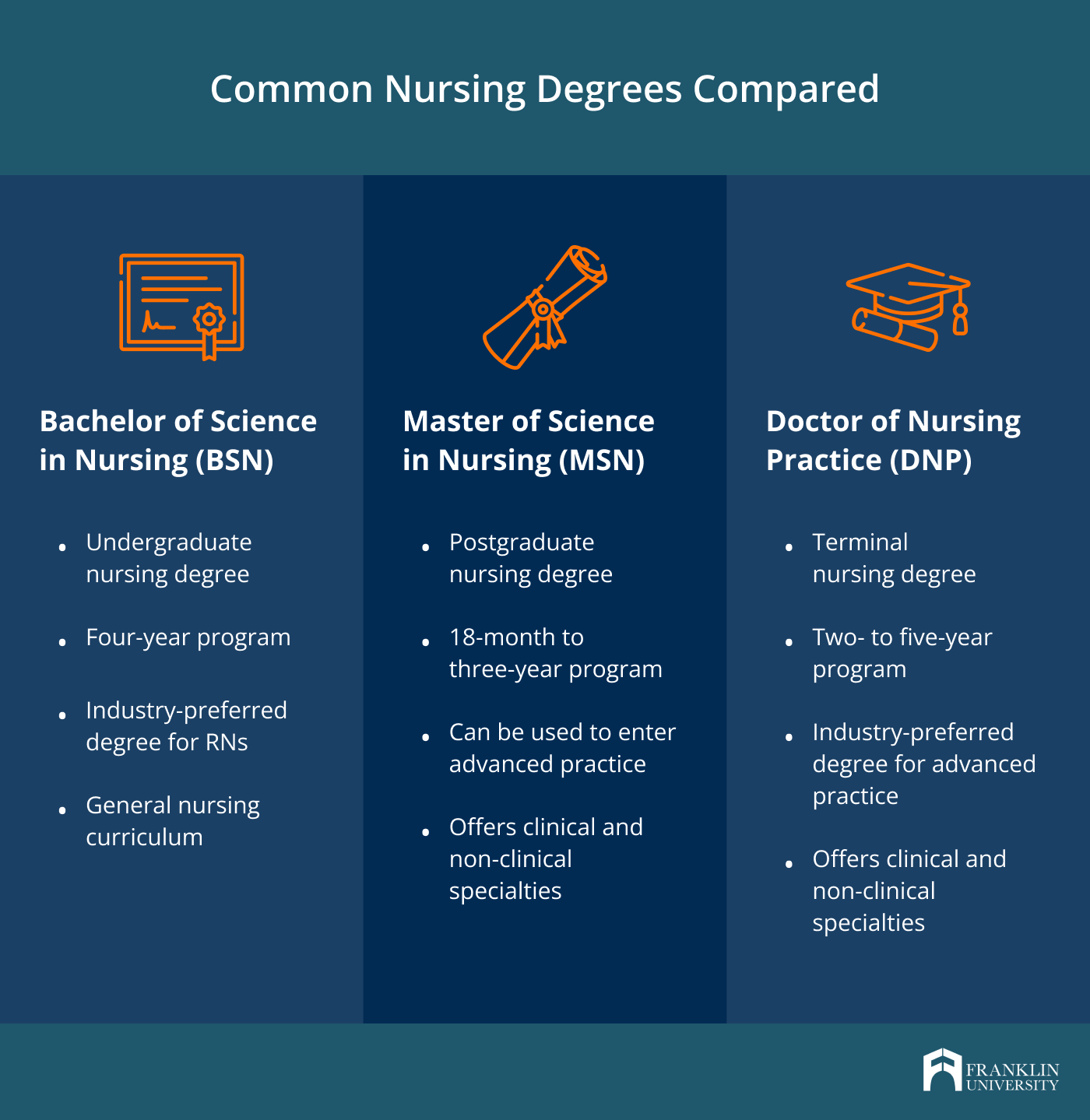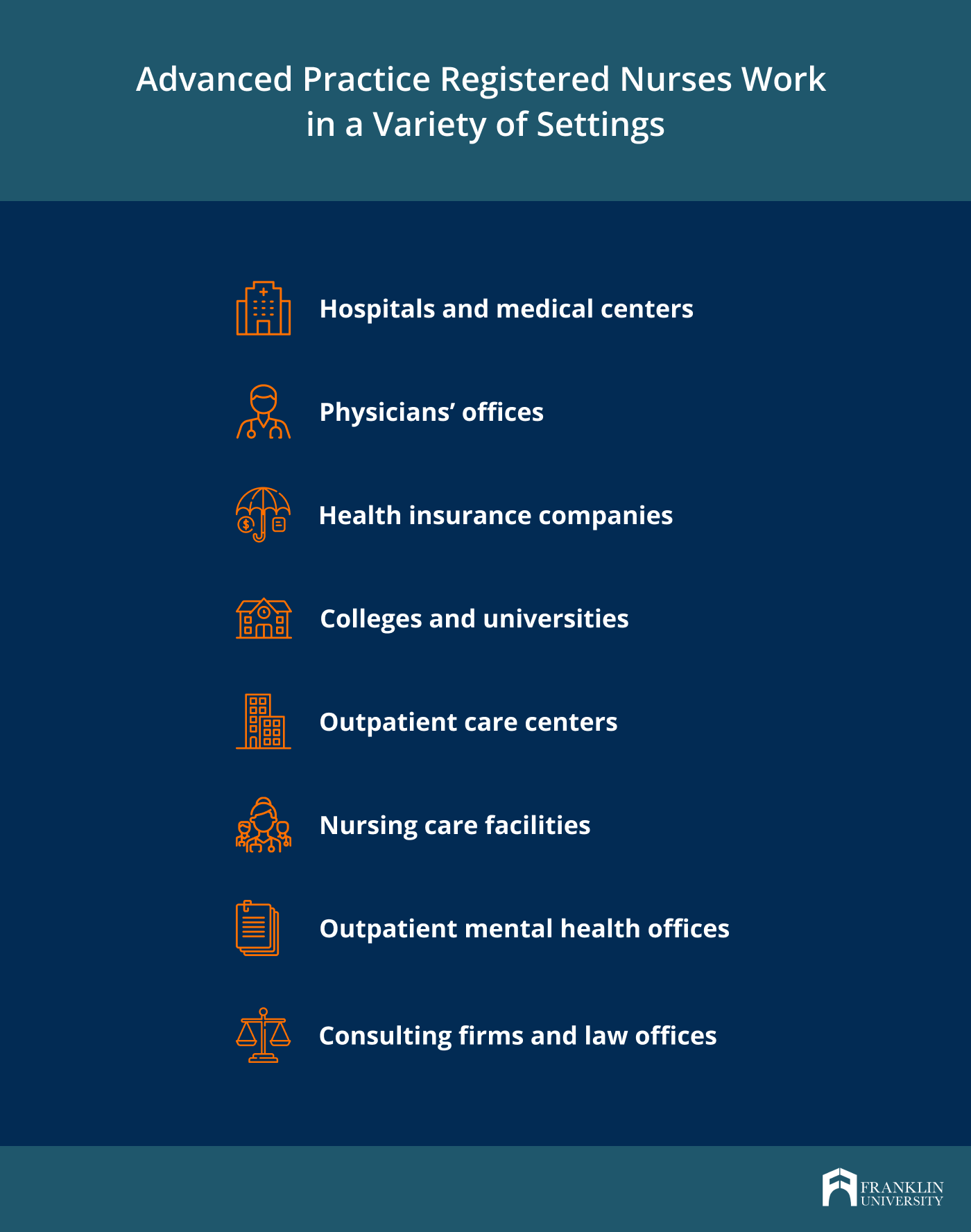Request Information
We're Sorry
There was an unexpected error with the form (your web browser was unable to retrieve some required data from our servers). This kind of error may occur if you have temporarily lost your internet connection. If you're able to verify that your internet connection is stable and the error persists, the Franklin University Help Desk is available to assist you at helpdesk@franklin.edu, 614.947.6682 (local), or 1.866.435.7006 (toll free).
Just a moment while we process your submission.

What Does a DNP Do?
As the U.S. population ages and medical research advances, more and more people are living longer with chronic health conditions that require ongoing management and support. While expanded treatment options are great news for individuals, they also mean we need more healthcare providers with the knowledge and skills to help these patients thrive.
Today, many health systems are looking to advanced practice nurses to provide this care and to highly educated nursing leaders to manage the complexities of healthcare operations. One way for nurses to help fill this need is to earn a Doctor of Nursing Practice (DNP) degree.
But what exactly is a DNP, and what do they do?
What is a Doctor of Nursing Practice (DNP)?
A doctor of nursing practice (DNP) is the highest clinical degree available to nurses. While it is a doctoral-level degree, it is not the same as an MD or DO, the degrees that doctors receive.
The DNP degree goes beyond the standard education of a bedside nurse by developing a deep knowledge of evidence-based practice and health system analysis and leadership. Nurses can choose programs with different focus areas to prepare for specialty nursing positions and for leadership positions.
Depending on your prior education, it can take two to four years to complete a DNP (or longer if you pursue the degree part time). In addition to coursework and practicum hours, DNP programs require a DNP capstone project. This involves creating and implementing a plan that applies research in the field to drive improved outcomes in a healthcare setting. DNP students who choose a clinical specialty must also complete supervised clinical hours.

How Is a DNP Different from a BSN?
A Bachelor of Science in Nursing (BSN) is a four-year undergraduate degree designed to prepare students to work as registered nurses (RNs). However, the degree itself does not confer licensure. BSN graduates must take and pass the NCLEX-RN exam to practice as RNs.
While it’s also possible to become a registered nurse with a nursing diploma or an associate degree, many hospitals and healthcare systems require or strongly prefer that their nurses hold BSN degrees at a minimum.
A DNP, on the other hand, is an advanced degree that goes far beyond the curriculum of a BSN. Typically, you’ll need a BSN degree to enroll in a DNP program, though there are a few “direct entry” DNP programs available to students with a different bachelor’s degree.
Get a FREE guide to help you advance your career, featuring helpful advice and thoughtful insights from nursing experts.
How Is a DNP Different from an MSN?
A Master of Science in Nursing (MSN) is a postgraduate degree that focuses on clinical practice and allows nurses to specialize in a certain practice area.
Nurses often use MSN degrees to prepare for nursing leadership roles or some positions as advanced practice registered nurses (APRNs). However, while it is currently possible to become a nurse practitioner or a clinical nurse specialist with an MSN degree, the field is transitioning toward requiring a DNP degree for advanced practice roles. Both the American Association of Colleges of Nursing (AACN) and the National Organization for Nurse Practitioner Faculties have recommended that the DNP be the minimum entry point for these roles by 2025. This shift has already taken place for nurse anesthetists, who can now only enter the field by earning a doctorate.
Like an MSN, a DNP builds nurses’ clinical knowledge and skills and offers the opportunity to specialize. However, DNP programs take a broader perspective on the healthcare system and emphasize the importance of leadership and quality improvement.
While some DNP programs require that entrants hold an MSN, today, the majority of DNP students enter their doctoral program without a nursing master’s.
What Do You Learn in a DNP Program?
If you enroll in a DNP program, you’ll learn to:
- Apply the latest research to improve clinical practice and patient outcomes.
- Evaluate how healthcare organizations function and find opportunities to improve quality of care, patient safety, health outcomes and organizational policy.
- Recruit, develop and manage high-performing healthcare delivery teams.
- Use data to make better decisions, both in the clinic and at the system level.
If you pursue a DNP program with a clinical track like family nurse practitioner or nurse anesthetist, you’ll also attain highly-specialized clinical skills and prepare for licensure. Attaining a license for some advanced practice roles will allow you to treat patients with a higher level of independence.

What Can You Do with a DNP?
Whether you want to continue in a hands-on patient care role or move into administration, a DNP can help you prepare for positions with increased complexity and responsibility.
DNPs work in settings ranging from hospitals and physicians’ offices to health insurance companies and universities. Common careers for DNPs can be split into clinical and non-clinical roles. Examples include, but are not limited to, the following:
Clinical
- Clinical nurse specialist
- Nurse midwife
- Nurse practitioner
- Nurse anesthetist
Non-clinical:
- Nursing informatics analyst
- Medical policy analyst
- Chief nursing officer
- Nurse educator
Many of these roles can be divided further by practice area. For example, a nurse practitioner might choose from several specialties, including family practice, women’s health and pediatrics.
Wherever you choose to work, as a DNP, you’ll be well-equipped to lead other professionals, drive decision-making and improve health outcomes at the individual and population levels.
Pursue Your DNP at Franklin University
If you’re interested in driving real change in the healthcare system, a DNP can help you build the knowledge and qualifications you need.
Franklin University’s accredited DNP program offers enrollment options for registered nurses with a BSN or an MSN, with online coursework and flexible scheduling to help you balance your degree with your life. Depending on your personal and professional goals, you can choose from four tracks to prepare for leadership positions or advanced practice.
Franklin’s highly competitive tuition, low fees and generous transfer credit policy mean you can earn your degree faster and at a lower cost, allowing you to move your career forward sooner.
Learn more about Franklin’s DNP programs.





